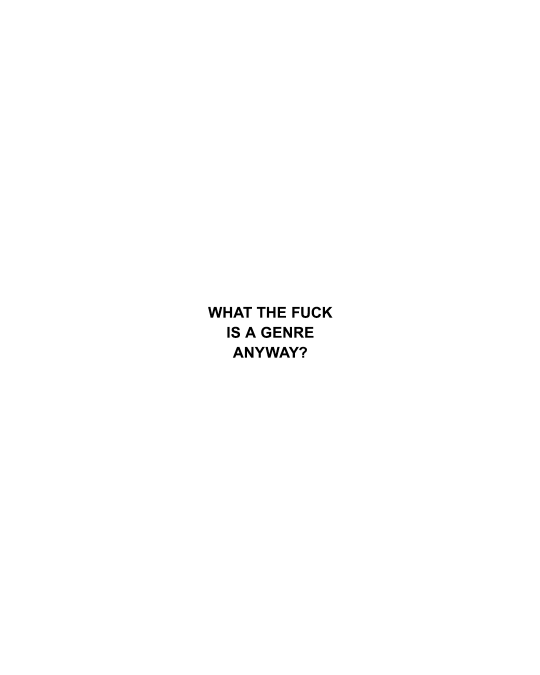What the Fuck Is a Genre?

People are indecisive. We switch back and forth between a democratic and republican president almost every four years. We pick one fashion trend until the next one comes along. And we listen to one genre before switching to another. These constant pendulum swings are historically enduring. Well, most of them. The last trend of genre indecision is a more recent development, but one that has snowballed into an important conversation about the role, if any, of the music genre.
Tyler, the Creator highlighted this idea in his response to winning "Rap Album of the Year" at the 2020 Grammy Awards,
"Whenever we, and I mean guys that look like me, do anything that's genre-bending...they always put it in a rap or urban category...and I don't like that urban word, it's just a politically correct way to say the N word to me. So when I hear that, I'm just like why can't we just be in pop...half of me feels like the rap nomination was a back-handed compliment."
His response to winning what is perceived as a massive honor may be surprising, but it is an honest reaction to a very real issue. The music industry relies heavily on neat genre categories to market its music, often to a fault. Though Tyler started out as a rapper, his album, Igor carries on where Flower Boy left off, establishing the rapper as a singer and fusing genres like pop, R&B, and hip-hop. Forcing Tyler's album into the rap category is brutally inaccurate and a perfect example of the dangers of prioritizing the genre label over the music itself.
While genre serves an important role in allowing us to characterize music, it should not limit the very creative continuum it aims to describe. Descriptions of different types of music can lead us too deeply into a pattern of creating music to fit those descriptions. Genre is a description, not a prescription. It is a characteristic, not a rule.
For the artist whose work lives in between genres, trying to place them within the confines of one genre or another is disingenuous. That's like forcing yourself to cry in order to feel an emotion - you're going to be unsuccessful the majority of the time. (Unless you're one of those extremely talented people who can cry on command. In that case, Leonardo DiCaprio, you do you).
With today's digital landscape comes wide and easy access to millions of hours of music. As Samuel Potts, head of radio at Columbia records, tells The Guardian, "Millennials or 'digital natives' are the first generation to literally have the entirety of the world's music at their fingertips.'" Whether that overwhelming possibility of choice paralyzes you or excites you to find your next favorite song, you are your own tastemaker. Globalization means no song is bound by geographic borders. Why then should we let an artist be chained to the borders of genre?
This is not to say that music existing peacefully within genre lines is a bad thing, or that genre should be obsolete (though I would love to see what a genre-less world looks like). Genre can be extremely helpful. In an era of intense music saturation, genre serves as a musical map, allowing us to discover other artists and pockets of music we like, both in record stores and in real life.
But genre becomes dangerous when it hinders the potential of great art and punishes those who do not fit within its archetype. Radio play, or lack thereof, is a good example of this. In his response to winning a Grammy for his genre-diffusing album, Tyler also explained his gratefulness for the award considering he does not "do radio stuff" and is not "played in Target."
Like genre, it is no secret that radio holds less prominence for younger generations. Perhaps there is a link between this age of increasingly genre-less listening patterns and the business model of radio, which still relies heavily on genre lines to determine what music is played and what listeners will presumably like. Imagine how radio would change if music selection was based on something other than genre, like the mood-based song selection model of Spotify playlists.
Another potential penalty is the presumptuous notion that an artist who swims between genres has a confused musical identity. We have seen this assumption with multiple artists, from the 1975 to Twenty One Pilots, who ultimately became successful while genre-bending. If Tyler, the Creator felt compelled by this notion enough to mold Igor to fit the confines of a genre, he would not have the Grammy-Award winning album he created. It boils down to order of operations. Music should not cater to genre. Genre should cater to music.
Rarely is an artist described with one word, and rarely does their music fit exclusively into one genre. Similarly, listeners rarely have a clear answer to the question, "who's your favorite artist? what's your favorite genre?" As the listener becomes increasingly genre-less, it only makes sense that the creator follows suit. After all, music creators are also avid music listeners.
The argument here is not that genres should disappear or that the Recording Academy should not base Grammy Awards on genres. But if we are going to employ genres to describe music, the least we could do is use them with care and give credit where it's due.
Our indecisiveness is not going anywhere. And the more our options exponentially increase, the more indecisive we are likely to get. This means that categorical boundaries, while helpful, are only getting blurrier. So next time you are jamming to the Ones To Watch playlist and a friend bugs you about switching from an anti-pop song to your new favorite bedroom R&B bop, just know - you are not alone.



